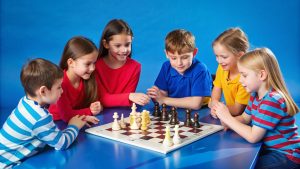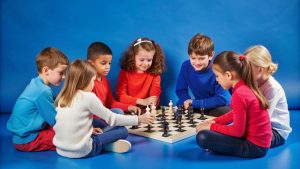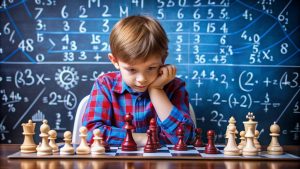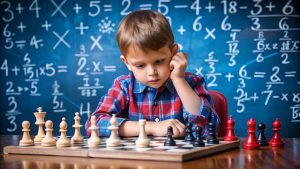The Cognitive and Academic Benefits of Teaching Chess to Kids
In this age of competition, pressure is always there on parents and teachers to try new approaches that may help in the development of cognitive and academic skills in children. Chess is one of the strongest methods to use for the teaching of kids. Chess is not a game; in fact, it is a strategic educational tool that has been known to have a number of cognitive and academic benefits.
The known advantages of teaching chess to children range from sharpening the memory and improvement of problem-solving skills to increasing their concentration and fostering their ability for logical thinking.
Chess for youngsters affects their studies and intelligence to a great extent. According to research, children who play chess on a regular basis always excel at various subjects in school, mostly mathematics and science, essentially because of the big numbers involving patterns, sequences, and calculations akin to the said disciplines. Moreover, it sharpens the child’s thinking many moves in advance, important for maintaining a critical style of thinking and proper planning to ensure success in school.
Apart from other cognitive and academic benefits of teaching chess to kids, it also inculcates in them the necessary patience, perseverance, and sportsmanship. Learning to navigate around the chessboard, children are trained to focus for long periods, accept and handle both defeat and triumph gracefully, and communicate positively with both peers and adults. Precisely these social and emotional skills play a huge role in the well-rounded development of personality.
Then, integration into a child’s program can be achieved through school chess clubs, classrooms, and home chess lessons, or by playing at home informally. With a fun and stimulating atmosphere regarding the learning of chess, parents and educators allow children to harness the full range of benefits this timeless game has to offer.
In this article, we will go a little deeper on the cognitive and academic advantages that teaching chess to children offers. We will present the cognitive and academic benefits this strategic game holds for children in securing their intellectual development and success in academics. Join us as we expose why chess is a worthy investment when taught chess to kids, leading them on their way to future success.
- Why should I teach chess to my child?Teaching chess to kids offers numerous cognitive benefits, such as improved memory, enhanced problem-solving skills, and increased concentration. These skills are crucial for academic success and overall cognitive development.
- At what age can children start learning chess?Children can start learning chess as early as 4 or 5 years old, depending on their ability to understand basic rules and concepts. Starting young allows them to develop foundational skills that can benefit them throughout their academic journey.
- What long-term benefits does chess offer children?Long-term benefits of chess include improved academic performance, enhanced critical thinking skills, and increased resilience. These skills prepare children for future challenges in education, career, and everyday life, fostering a lifelong love for learning and intellectual growth.
- Can chess help children with learning disabilities?Yes, chess can benefit children with learning disabilities by providing a structured environment for learning and improving concentration. The game's rules and patterns can be easier for some children to grasp, boosting their confidence and self-esteem.
Cognitive Benefits of Chess
Chess is popular, mostly in developing the abilities of young kids, but adults, too. It increases the cognitive health that builds intellectually due to the complexity and logic behind the game. Here, we explore the specific cognitive benefits of chess and how teaching this game to children changes their mental development.
-
Improves Memory
Arguably, one of the biggest cognitive advantages chess has to offer is that it greatly impacts memory. Chess involves a process where players have to remember different rules, positions, and strategies. A child will actively recall games played previously and predict the outcome of the next moves.
This process helps in developing the child’s short and long-term memory. There are academic and non-academic studies that have since proclaimed children’s tournament performances in chess as exemplary in memory. This will hence mean that this increased memory will not only help in chess, but enhance the probability of a child having high retention on school subjects like history, language husks, and science.
-
It Improves Problem-Solving Abilities
The game of chess is basically a problem‐solving game. Every move is linked to a different constraint. Every move that players have to make is anchored on an underlying strategic solution. One has to look at the board, look at the likely moves that an attacker is likely to make, and devise a strategy that will counter such moves.
This brings a series of problems to solve for the child. It brings the realization that, indeed, such a skill is very useful and very transferable, enhancing a person’s ability in solving complicated problems in mathematics, science, or real life. A child learns to think much ahead of the game and to consider multiple outcomes—what it takes to be proficient in problem-solving.
-
Increases Concentration and Focus
This is because to play chess, it is a game; hence, it demands one’s concentration and attention. The kids have to be sharp and keenly observe what the other participant is doing. The planning of his or her moves should also be of putting careful thought so as not to make a mistake. This, therefore, makes children develop the concentration of the mind for a long period of time.
Focused spans are thus helpful not only in academic setups, where one must assimilate and apply new knowledge, but also in the regular daily activities, where much attention has to be laid on details. It has been discovered that children who play chess regularly develop an increased attention span in classes and towards their homework and class work, something that may aid them in performing well academically.
-
Promotes Logical Thinking
Chess hones logical and analytical thinking. In this game, each and every move has to be properly thought out, and players have to calculate the possible repercussions of the moves that have been made by them. This logical reasoning is quite akin to the processes used in subjects like mathematics and computer science where step-by-step analysis is involved.
Through the game of chess children qualify themselves into such a state of mind where they become able to embrace problems methodically, until eventually they think through every outcome before coming to some conclusion. In other words, children gain such structured thinking over a period to be very resourceful in their other academic activities, besides problem-solving in several fields.
-
Develops Spatial Awareness
Chess also helps develop spatial awareness—an ability to understand and recall the spatial relationships between objects. This, too, is a very important cognitive skill that can quite easily develop from visualizing the chessboard and the movement of the pieces.
One examines future moves and is thus expected to understand how that prospective move would alter the arrangement of the board. More spatial knowing might help a student in geometry or physics when the relation between objects is very important.
-
Develops Creativity
Though it is generally seen as the “brain” or left-brain logical game, chess is the right-brain creative game. There exists an almost infinite combination of a series of moves/designs that any game could take. It requires the creation of new plans, strange, surprising moves to get ahead of the rivals.
This blending of creativity and logic helps children achieve a balance in thought, where they can think of imaginative things at the same time as they are able to hold on to logical principles. Children can be creative in writing or art or any other field of creative problem solving if chess promotes creative thinking. It develops and builds strengths that can be quickly aired out for instant solution in other areas.
-
Improves Executive Function
According to Eisenberg in 1997 and Miller in 2001, executive function can be referred to as the working memory facility, flexible thinking, and self-control. It is the very important receptive skill that one uses when one has to plan, has to pay attention, hold and manipulate the pieces of information in mind, and be juggling with multiple tasks.
In the game of chess, a player is bound to be coordinating these very processes, thereby enhancing his executive function. Improved executive function leads to higher academic achievement as children become more organized with their thoughts, wisen users of time, and become better independent performers.


Academic Benefits of Chess
Chess is not just an intellectual game or a game of strategy but an educational force, able to lift a child’s academic success to a higher stratum. Chess increases cognitive skills significantly in areas such as critical thinking, problem-solving, and memory, which are elements that cause better performance in practically all subjects of study.
We will look at the boundless academic benefits of teaching kids chess and how this game of strategy can aid the schooling journey.
-
Improves Math Skills
An outstanding academic benefit of using a tool like chess is its great effect on mathematics. It inherently presents mathematical phenomena regarding patterns, sequences, and geometrical shapes.
Chess calls one to calculate possible moves, to foresee consequences, and to recognize patterns on the board—all basic aptitudes in mathematics. The regular practice of chess enables children to acquire a good hold of mathematical concepts and become more adept at doing calculations based on numbers and other problem-solving. Observations indicated that children who play chess regularly tend to perform better on math tests and show an increased aptitude for such arithmetic, algebra, and geometry knowledge areas.
-
Enhances Reading and Comprehension
Chess also supports reading and comprehension skills. Considering the game is premised on pattern recognition and the ability to estimate the result of different moves, these skills may be transposed to reading comprehension.
Understanding the flow of a game, anticipating the opponent’s strategies, and planning your move require almost precognition and understanding of comprehension, much as texts do. Chess-playing kids may be better readers because through the game they learn to read between the lines, get context, hold the highlights, and predict future storylines that stabilize comprehension of a story. The improved comprehension might result in better performance in language arts and other similar subjects that require strong reading and interpretative abilities.
-
Develops Planning and Foresight
In fact, planning ahead is part of the skill in chess-like academics. Chess teaches children to think several moves ahead, research the outcomes their activities bring, and to plan their moves such that they will result in a success of strategy.
This translates well to planning in academic work, project-based learning, scientific experiments, and essay writing. As such, children who learn how to plan through playing chess have much better prospects to lead lives that are organized and managed, with all their tasks being well completed within the planned time limit. The skill does not only boost academic performance but also preconditions the children for further challenges in both further education and careers throughout their lives.
-
Encourages Patience and Perseverance
Chess can be a very patient game; in the course of playing it, one has to carefully think before acting on any move. Patience and the ability to stay on even when things are not going their way are essential skills in a learning situation.
Children who play chess learn to stay focused, work through hard problems, and stay with them until they resolve the situation. These values of tenacity are indispensable for academic glory, especially for those really arduous subjects where the rewards are not immediately realized. The ability to endure tough tasks and be patient in striving for a goal goes a long way in securing ideal academic results and in developing a resilient attitude to learning.
-
Enhances Analytical Skills
Chess sharpens analytical skills vital for excellence in academics. The game entails a player’s evaluation of their game position, the assessment of their opponent’s moves, and making decisions which are logical reasoning.
The form of thinking in the description above is directly applicable in STEM subjects, where the students are expected to analyze data and make conclusions as well as solve problems. Playing chess has children develop a methodological approach to analysis, which may further upgrade performance in these subjects and have a great impact on overall capabilities in other school subjects.
-
Fosters Discipline and Responsibility
Chess is a game that imparts discipline and responsibility in the child since they learn that they have to live by the rules of the game and carry the responsibility for the moves they make when they play the game.
Sense of discipline and accountability is therefore embraced and taken to an academic setting, where students have to adhere to classroom rules, be responsible with assignments, and take responsibility for their learning. Kids who engage in chess on a regular basis are able to manage time effectively, accomplish tasks with priority, and have a sense of responsibility toward their studies. Thus, such disciplined students become better-organized ones and have the ability to develop study habits to increase academic achievement.
-
Promotes Creativity and Innovation
Even though considered a game of logic, chess on most occasions exudes the creative and innovative aspects of a player since it demands coming up with different and innovative strategies, and moves, to trump an opponent.
This blend of creativity and logic will therefore help the children make a healthy balance in their cognitive approach, where they can think out of the box yet rationally. Indeed, the development of creative thinking by playing chess will help to make a child approach academic disciplines in an innovatory way, meanwhile possibly leading to original ideas and creativity in such areas as creative writing, drawing, and scientific research.
-
Improves Test-Taking Skills
And more highly, the mental skills acquired by children through playing chess are critical in the enhancement of their test-taking skills. One develops a cool head under pressure, good time management in a game, and abstract thinking to solve a problem.
These abilities find direct application in a test-taking situation where students are focused, have a good time span management, and such thinking to respond with precision. That developed test-taking skill will result in good performance on standardized tests and examinations, and in turn will result in the overall good academic achievement.

Social and Emotional Benefits
While chess is known for its cognitive and academic benefits, the game can teach a child valuable lessons, ultimately cultivating the learner’s character. When children are taught chess, it builds in them confidence, patience, and empathy, all assimilated for the betterment of other things.
This article examines some of the social and emotional influences of chess, how in essence a game of skill and strategy would promote the general development of a child specifically in his or her relationship with others and the general emotional health.
-
Builds Confidence
One of the deepest social and emotional benefits that chess brings to a child is an increase in self-confidence. A sense of accomplishment is derived from being able to grasp the strategies of conquering games through skill and planning in chess.
They can now be more confident in their abilities, something that can positively overflow and make them approach problems in academics and social situations with greater self-confidence. As children grow and develop confidence in the area, they become more knowledgeable about the chess game, starting to believe in their ability to wishfully think—the key to their personal growth and self-esteem.
-
Teaches Sportsmanship
Chess can be counted among the further sportsmanship because children will learn how to cope with winning graciously and losing willfully. Winning and losing are both part of the game, and this, too, helps children develop a proper realization about the nature of competitiveness that underscores respect for opponents and the value of fair play.
Chess teaches the child to celebrate wins without arrogance and to accept losses without tantrums, thereby procuring an unbiased and decent attitude toward competition. Working this way develops general sportsmanship, helping children feel at home in various environments and be able to resist all sorts of competition.
-
Encourages Social Interaction
More importantly, chess often involves playing with peers, being part of chess clubs, and competing in tournaments. Chess environments help children to be able to make new friends and develop certain social skills as they do so.
Chess clubs and tournaments bring together a community whereby young ones share their passion for the game and learn together. These social interactions help children improve their communication skills, make friends, and develop a great sense of camaraderie. The collaborative setting in a chess club also helps children appreciate the value of real teamwork and collective learning.
-
Fosters Emotional Resilience
It is more like a game that comes with ups and downs, and victory and defeat come through in very quick successions and sometimes very frequently. Thus, it actually enables a child to learn how to cope up with certain drawbacks and bounce back over failures.
An emotionally resilient child is one who can handle disappointments and challenges effectively on and off the chessboard. This instills a growth mindset in children; they learn to persevere despite losses and continuously strive to get better. It is a mindset important to their affective health because it helps them look at the challenge not as an obstacle but at it the other way around.
-
Enhances Patience and Self-Control
This is a game that is best for building patience and self-regulation as key traits. In the process of playing chess, a player is compelled to think before carrying out the moves, trying to predict what the opponent has conceived in their mind, and keeping still until it is done.
The demand for being patient and self-controlled helps the child learn to stop and think before something so as to manage his/her feelings and impulses. More patience will help the children to ensure that they remain peaceful and calm, thus avoiding stress. Better self-control will provide that they are in control of their actions and also make decisions from an informed point.
-
Fosters Emotional Resilience
Chess is a game of rewards and loses. It happens in very rapid situations. This in turn asserts that children learn to rebound quickly from failures. Teaching the children emotional resilience through chess helps one to deal with the disappointments and porridges of life both in and outside the game of chess. On the other hand, children learn and get used to progressing ahead even after failing and continually working to do better in the future; the result is a growth mindset.
A growth mindset bears importance toward emotional well-being in a child in the sense that they get to do better in life if they regard challenges as something that will make them grow rather than hurdles to encounter. It’s a game that demands deep thinking on the part of the player, expecting an opponent’s counter strategy and a lot of patience all over the game. It tells the child that sometimes one has to pause before doing anything and think about how to go about it, thereby teaching him the self-regulation of emotion and impulse. Improved patience can make a child be cool and collected even when the going gets tough, with better levels of self-control regarding the control of behavior and well-thought-out decisions.
-
Promotes Empathy and Perspective-Taking
Chess helps children learn how to understand and predict the actions of their opponents. The player learns to appreciate different points of view and a sense of empathy for predicting their opponents’ actions. Empathy is a very important skill for good relations and effective communication. Empathy enables kids to associate themselves with the feelings and experiences of other people to be kind and cooperative during socialization.
-
Reduces Stress and Anxiety
Playing chess is considered as an effective way for anxiety and stress reduction through mental stimulation. The focus required to play chess helps children take their mind off worries and immerse themselves in the game. Helps in easing the involvement of getting into the game.
This mental engagement brings a healthy distraction from the stressors and thus relaxation. Moreover, the ordered structure in the game of chess, along with rules and clear objective, provides a sense of stability and control, i.e., reassuring for children in a state of fear and agitation. The regular playing of chess may be called therapeutic to emotional health.
-
Enhances Communication Skills
There could be loads of communication – verbal and non-verbal – going on during the game of chess. While deliberating on strategies, children exchange experiences and are involved in friendly debates. The game also consists of formulating non-verbal cues, tackling any object on the board, or any meaning on an opponent’s body language or facial expression and therefore works on enhancing the non-verbal communication skills.
Communication being the most vital skill, it is a prerequisite of grabbing more opportunities to succeed in social life, academics, and future professionalism. By enhancing the power in them to communicate clearly and effectively, children will be able to build relationships stronger and handle social circumstances better.
- Creates a Community and Promotes a Sense of Belonging
They have a sense of belonging. Chess clubs and tournaments help children feel that they are associated with a certain activity. Environments are fashioned to be supportive and all-embracing to pave way for the children to share their interest in chess and its associated practices.
The sense of belongingness and camaraderie that such settings create cultivates positive social links and friendships. Being part of a chess community also presents role models and mentors that can assist children and mold their ideas and desires. This is very key in their social and emotional development because it will enable them to understand better their identity and self-value.

Implementing Chess in Education
Incorporating chess in educational curriculum provides students with a variety of cognitive, academic, social, and emotional benefits. In schools and educational institutions, there are various ways of introducing chess into the system, from chess clubs to incorporating chess lessons in the normal curriculum. This section provides an explanation of how to introduce chess into education with examples of implementation and its associated benefits.
Establishing School Chess Clubs
- Creating a Structured Environment:
- School chess clubs provide a structured environment where students can regularly practice and play chess.
- Clubs offer a dedicated space and time for students to engage with the game, ensuring consistent practice and development.
- Encouraging Peer Interaction:
- Chess clubs promote social interaction among students with similar interests.
- Regular club meetings create opportunities for students to make friends, collaborate, and learn from one another.
- Organizing Competitions and Tournaments:
- Chess clubs can organize internal competitions and participate in inter-school tournaments.
- Competitions provide a platform for students to showcase their skills and gain recognition, boosting their confidence and motivation.
Integrating Chess into the Curriculum
- Incorporating Chess Lessons:
- Schools can introduce chess as a part of the regular curriculum, offering structured lessons during school hours.
- Chess lessons can be tailored to different age groups and skill levels, ensuring all students benefit from the game.
- Cross-Disciplinary Learning:
- Chess can be used to teach concepts in subjects like mathematics, logic, and critical thinking.
- Teachers can create interdisciplinary lessons that incorporate chess strategies and problem-solving into various subjects.
- Developing Critical Thinking Skills:
- Chess encourages analytical thinking, planning, and strategic decision-making.
- Integrating chess into the curriculum helps develop these skills, which are crucial for academic success.
Utilizing Technology and Online Platforms
- Online Chess Programs and Apps:
- Schools can leverage online chess programs and apps to provide interactive and engaging learning experiences.
- Digital platforms offer tutorials, puzzles, and games that cater to different skill levels, making chess accessible to all students.
- Virtual Tournaments and Clubs:
- Online platforms can facilitate virtual chess clubs and tournaments, allowing students to participate remotely.
- Virtual interactions enable students to connect with peers from different schools and regions, broadening their social network.
- Interactive Learning Tools:
- Technology can provide interactive tools for teaching chess, such as virtual chessboards, instructional videos, and animated lessons.
- These tools make learning chess more engaging and visually appealing for students.
Training Teachers and Instructors
- Professional Development Programs:
- Schools can offer professional development programs to train teachers in chess instruction.
- Training ensures that teachers have the necessary skills and knowledge to effectively teach chess to students.
- Certification Courses:
- Schools can collaborate with chess organizations to provide certification courses for teachers.
- Certified instructors can deliver high-quality chess education and mentor students in developing their skills.
- Ongoing Support and Resources:
- Providing ongoing support and resources for teachers ensures they stay updated with the latest teaching methods and strategies.
- Access to chess curricula, lesson plans, and instructional materials enhances the quality of chess education.
Engaging Parents and the Community
- Parent Workshops and Involvement:
- Schools can organize workshops and informational sessions for parents to highlight the benefits of chess.
- Encouraging parental involvement helps create a supportive home environment for students to practice and improve their chess skills.
- Community Partnerships:
- Collaborating with local chess clubs, organizations, and community centers can provide additional resources and support for school chess programs.
- Community partnerships can also offer opportunities for students to participate in external tournaments and events.
- Hosting Chess Events:
- Schools can host chess events, such as open houses, exhibitions, and friendly matches with community members.
- These events promote chess within the community and foster a culture of learning and engagement.
Addressing Challenges and Ensuring Inclusivity
- Overcoming Resource Constraints:
- Schools can seek funding and grants from educational organizations and sponsors to support chess programs.
- Utilizing low-cost or free online resources can help overcome budget constraints.
- Ensuring Inclusivity:
- Chess programs should be designed to be inclusive and accessible to all students, regardless of their background or abilities.
- Providing adaptive resources and support for students with special needs ensures that everyone can participate and benefit from chess.
- Creating a Welcoming Environment:
- Schools should foster a welcoming and encouraging environment where students feel comfortable learning and playing chess.
- Celebrating diverse achievements and providing positive reinforcement helps motivate students and build a supportive community.
- What are the social benefits of playing chess?Playing chess promotes social skills such as sportsmanship, patience, and teamwork. It provides opportunities for children to interact with peers, build friendships, and participate in collaborative learning environments like chess clubs and tournaments.
- How can chess tournaments benefit children's development?Chess tournaments provide children with opportunities to test their skills, gain confidence, and learn from more experienced players. Participating in tournaments enhances competitive spirit, resilience, and the ability to handle pressure, contributing to overall personal growth.
- Is chess suitable for children who are not academically inclined?Yes, chess is suitable for all children, regardless of academic inclination. The game offers a non-traditional approach to learning that can engage children who may not excel in conventional academic subjects. It encourages creativity, critical thinking, and problem-solving in a supportive environment.
- How does chess impact cognitive development in children?Chess enhances cognitive development by stimulating neural growth, improving problem-solving abilities, and promoting strategic thinking. Regular practice can lead to stronger analytical skills and better memory retention, essential for academic success.
- What role does chess play in developing critical thinking skills?Chess develops critical thinking skills by requiring players to analyze positions, evaluate options, and anticipate opponent moves. This process strengthens logical reasoning, strategic planning, and problem-solving abilities, which are essential for academic and personal success.
Conclusion
Chess instruction for youngsters is clearly more than a hobby; it is a powerful investment in their cognitive growth and academic development. Chess skills acquired support learning at school and are applied further in students’ lives: memorization, problem-solving, attention, and reasoning skills are promoted for learning to be effective and academic performance to be successful. Chess enhances the memory, problem-solving abilities, and powers of concentration that are key to success in school and in personal growth.
What it includes is the time spent at it, the setbacks, and the discipline to get right back on course with the grace required for success. That’s a lot that children will carry in life—it breeds responsibility, accountability, and forward-thinking. Chess is a strategic game and therefore instills planning skills that empower children to be ready for any challenges that they work through, so they can make wise decisions.
As a parent and educator, creating a love for the game of chess brings about a world of intellectual and academic opportunities for our children. Being included in the educational curriculum of schools and in the official curriculum of teachers, and involving parents, will create the conditions for every child to succeed. Chess is not a game, but it is a great tool for the transformation of your children.



0 Comments